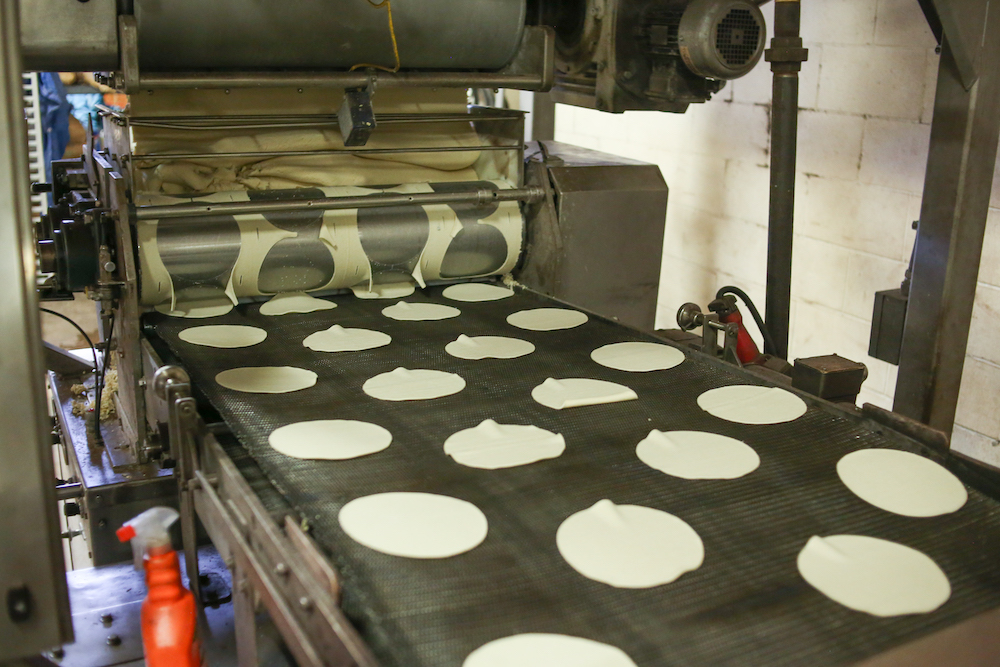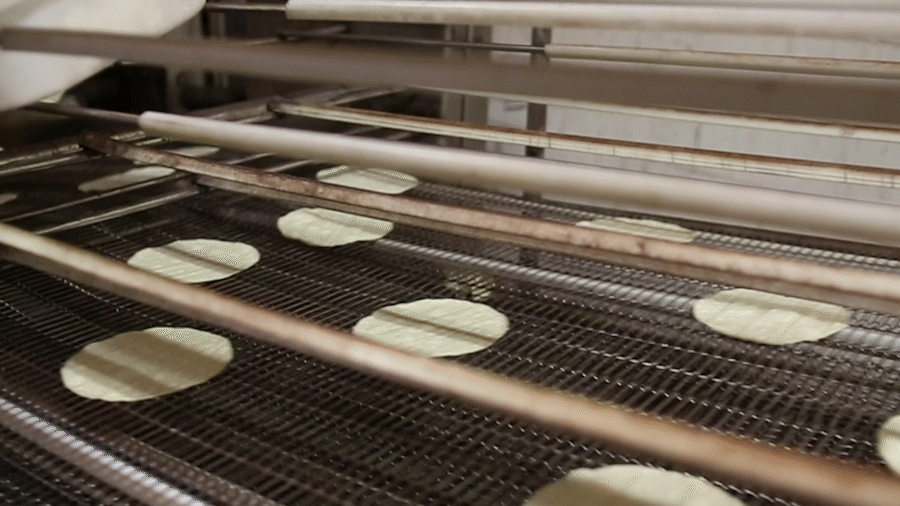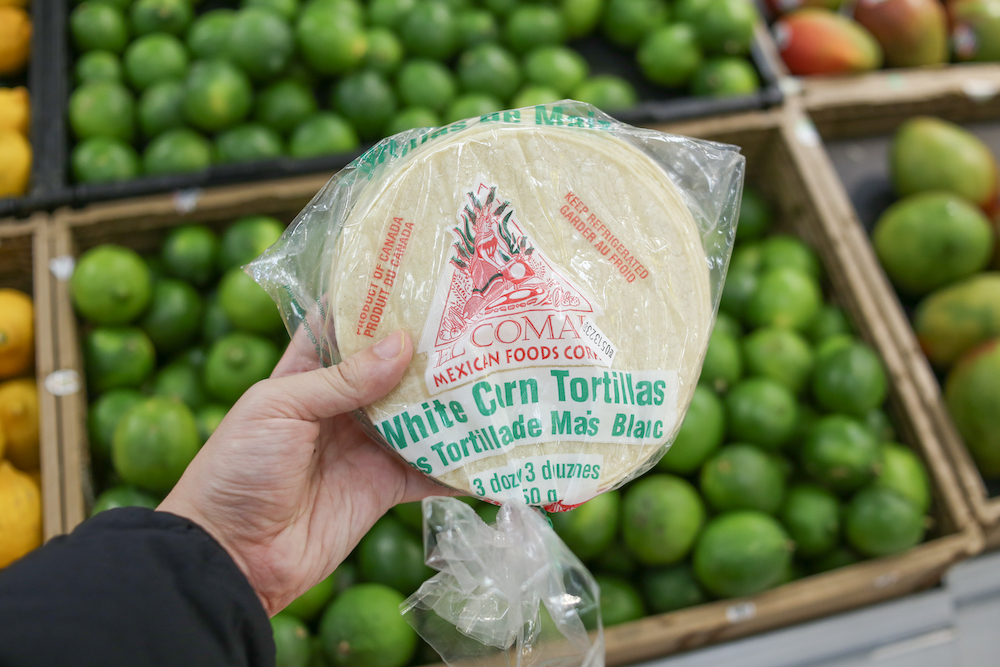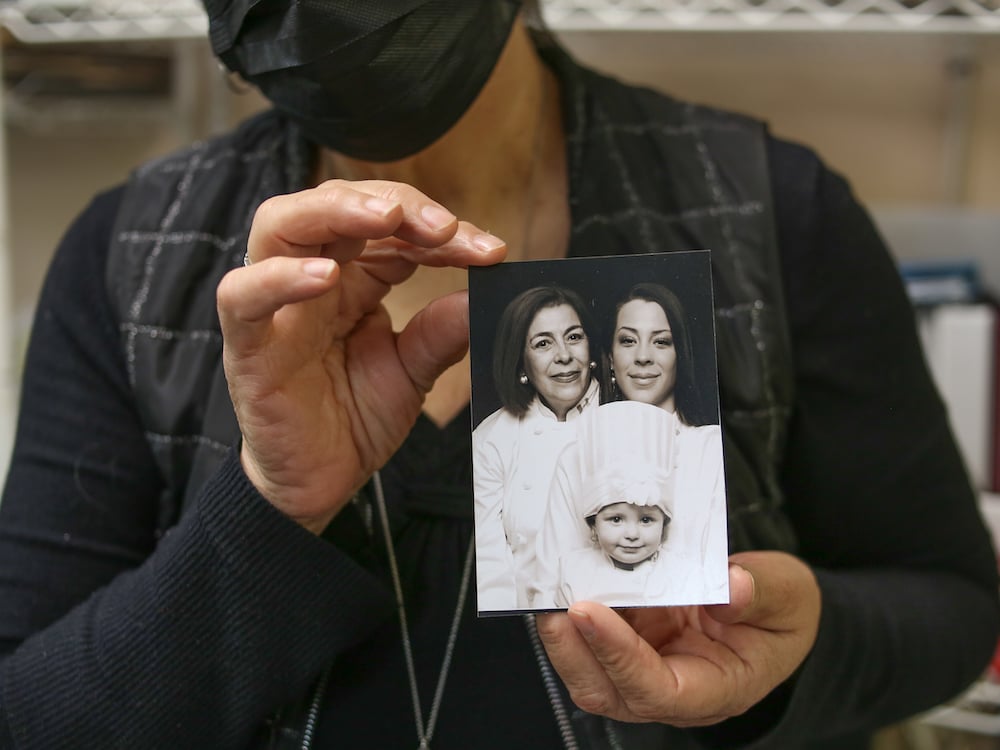When Elsa Nuñez moved to Vancouver in the late 1980s, she had a joke about the unnatural hardiness of the frozen American tortillas you could get from local stores.
“You can leave it in your will to your grandchildren. They will still be OK,” she said. “They have so many preservatives when you open them. When the corn is bad, it’s hairy.”
It was ironic that the trade commission of the Mexican consulate itself, where Nuñez worked in Vancouver, couldn’t get fresh ingredients for their native dishes when they wanted to cook for parties. She was desperate enough to buy the frozen American tortillas on occasion, but they never satisfied.
“Look at this tortilla!” she’d say to the manager at the store. “You have to throw it away!”
“If you don’t want it, buy it yourself!” he’d reply, daring her to find another source in what was then a local tortilla desert.
So Nuñez made special trips across the American border to buy fresh soft corn tortillas for the consulate’s parties.
While they can be made at home, it takes expertise to master the variables and press them to the perfect thickness. Dough that is kept too warm will sour and too cold will dry out. Overcook them and they will lose their tenderness.
Many opt for convenience instead. Fresh tortillas can be bought readily all over the U.S., from small producers to supermarkets to large suppliers.
“There was nothing like this in Canada,” she said. “People were not familiar with Mexican cuisine. For the few people that came from Mexico, we were all looking for this.”
There was such a strong sense of longing for tortillas in the local Mexican community that there was even a market for the frozen ones, a placeholder for a daily staple as ubiquitous to Mexico as bread and rice in other parts of the world.
But then Nuñez started thinking. Wouldn’t it be nice to have a Mexican deli of her own? With a tortilla machine that made them fresh and a counter that sold salsa, cheeses and guacamole?
That dream became El Comal Mexican Foods, which she opened in 1996.
At a facility on Burnaby’s industrial Winston Street, El Comal’s tortillas are hot as they zip down the conveyer belt in quadruple file to be packaged for stores and restaurants, saving them from having to make their own from scratch. There’s an industrial deep-fryer for El Comal’s line of chips, and Nuñez’s deli, where locals pick up goods for home or stop by for made-to-order tacos and tamales, burritos and enchiladas.
The local Latino grocers still carry American-made tortillas, albeit an ever-expanding selection in their fridges. Meanwhile western supermarkets stock Tex-Mex-style products from brands like General Mills’ Old El Paso label, with their boxed dinner kits. What fresh tortillas they have are usually large and whole wheat for wraps, rather than the traditional corn. Twenty-seven years later, El Comal is still a rare producer — though not the only producer — of fresh soft corn tortillas in the Lower Mainland.
Nuñez, now 70, is looking back. She brought in all the American machinery that it took to make her tortillas. She battled inspectors who threatened to shut her down. She hunted for vendors in Latino neighbourhoods to carry her product. At one point, she even opened a bistro and hosted cooking classes. All the while, she was a single parent raising a daughter and later a granddaughter.
The more her business grew, the more she had to give.
“When you open a business, you think you’re going to have freedom,” she said. “That’s not true. You sacrifice your family. Because you have to be here all the time.”
Seven hundred tortillas per hour
In 1996, Nuñez eyed a spot for her tortilleria on the ground floor of the Spanish Cultural Centre on New Westminster’s Carnarvon Street.
“They didn’t want to rent to me because I didn’t have any experience,” she said.
But Nuñez liked the location, especially since a SkyTrain station was nearby. She was able to convince the landlord with her confidence.
“I’m going to make it,” she told him defiantly.
Because Nuñez owned a house, the bank was willing to give her a loan. It cost her $300,000 to buy a tortilla machine. It was able to produce a single line of 700 tortillas per hour — but only if there were no kinks.
“There were times when I wanted to hit it with a broom because it wasn’t working properly!”
The tortilleria was open Monday to Friday. On the weekends, Nuñez drove down to the U.S. to buy corn flour to make masa, the dough. While corn is one of Canada’s largest grain crops, she couldn’t find anyone milling it because there was no demand at the time.
She would remain frustratingly dependent on the U.S. throughout her business, from the ingredients to the nightmare of needing new machine parts unavailable in Canada.
The stress on her marriage from the business eventually led her to divorce her husband. And so Nuñez would show up to work with her young daughter, who grew up in the tortilleria.
Door knocking
The fresh tortillas were finally in hand. But there was a new challenge: selling them.
“Nobody knows you, so you have to knock on doors,” said Nuñez, who showed up at one grocer after another.
“Please,” she would say. “I’ll give it to you on consignment. You don’t have to pay me. Just take it. If it doesn’t sell, I’ll take it back — you don’t lose any money. I know the Latino people come to your area.”
It took many rejections and a lot of persistence before they started saying yes.
“So I’d bring the tortillas, put them in their refrigerator, and say, ‘I don’t want you want to lose any money. I want you to make money with me. Allow me to do that. This is my price to you, I keep it very low.’”
When Nuñez would return the following week to see how the tortillas were doing, the store owners couldn’t get enough.
“What took you so long?!” they’d cry. “I don’t have any more!”
Nuñez’s little machine was not perfect. The tortillas wouldn’t always come out perfectly round.
“But it didn’t matter if they were crooked or not,” she said. “There was nothing else. I was the only one making them. My tortillas were all broken up — but they were fresh.”
It wasn’t just Mexican locals who came to buy them, but also immigrants from El Salvador and other countries across Central and South America. As Mexican cuisine gained more prominence in North America, non-Latino locals started to buy them as well.
Two and a half years after she opened El Comal, Nuñez decided she needed a bigger machine.
Fighting for chips
After moving to the bigger production facility in Burnaby, the machine that made one line of tortillas was swapped for another that could make two. It wasn’t long before Nuñez swapped it for another that could make four.


But more space meant more scrutiny from inspectors.
“There’s power in them because they have power over you. They can close you right there,” she said. “Some of those inspectors are nice. Some of them are your worst enemies.”
The large Burnaby facility had room for a deep fryer. But a fire inspector was in the way of Nuñez launching her latest product: tortilla chips.
The day the inspector came, he noticed that one of two emergency bulbs was dead and that the fire exit had a latch lock.
“You’re going to kill people here!” she remembers him shouting. “If there’s a fire here, you’re going to kill them because they’re going to be trapped!”
Nuñez said she heard him and asked him to stop shouting. He did not.
She made the necessary changes, but when it came time for the inspection, he didn’t show up. Three months later, he returned to tell her about other new changes she would have to make.
When she first became a business owner, Nuñez preferred not to speak up about things she thought were unfair.
“He made it so bad for me,” said Nuñez. But after years of keeping her head down, she decided to make a complaint.
The inspector showed up during his next visit accompanied by his boss.
“He was a perfect gentleman,” she said. “He introduced himself very nicely. He looked at me and he said, ‘Let’s walk through your premises together.’”
The inspector behaved very politely in the presence of his boss. Nuñez couldn’t believe it, remembering that he was “as smooth as silk.”
At the end of the inspection, the boss said, “Nothing is wrong. Everything is perfect. This lady can have it.”
With the tortillas multiplying and the chips frying, Nuñez expanded to North Vancouver in 2006. She opened La Mexicana on Marine Drive, her own restaurant and grocer where she also offered cooking classes.
It did well. But it’d be 3 a.m. by the time she got home.
“Instead of walking up the stairs I crawled up,” she said. “I threw myself into bed. My kid was there and I grabbed her and I went to sleep.... And I had to get up at 6 a.m.”
Nuñez eventually closed it, happy for the lessons it taught her. But her other restaurant in Burnaby, attached to the tortilleria, would run foul of inspectors too.
She still remembers the item that got it shut down: chile relleno. It was a few degrees shy of a required internal temperature of 60 degrees.
She was in the hospital at the time, waiting for her hip replacement surgery, when her staff called her with the news: the inspector shut the restaurant down.
After the surgery, Nuñez was in a daze, wondering if it was all a dream.
A few days later, she took a taxi to city hall for help. She came up with a new food safety plan but it took a long time for the inspector to come and give them the approval to reopen. But eventually it would be shut down again. Nuñez decided to give up on the restaurant and run a take-out counter instead.
All the expenses and setbacks added up. Over the years, she’s spent thousands of dollars on contractors, equipment and requirements like earthquake proofing her vents.
“You have to pay, otherwise you can’t open,” she said. “It takes away the little money you have to grow.”
Too many tortillas
“Why don’t you work at a gas station?”
Nuñez still remembers when her daughter asked her the strange question.
“My friend’s mom works at a gas station,” her daughter went on to say. “She’s always at home.”
Hours were long at the tortilleria. Even without the restaurant in North Vancouver, Nuñez’s days started at 6 a.m. and ended around midnight — when calls could come in from restaurants asking her to make an early delivery the following morning.
“And you have to be there,” said Nuñez, who knows that interrupting the supply would lead them to look for tortillas elsewhere. “You have to be there no matter what, even if you’re sick.”
After she received her hip replacement, the doctor told her not to drive for three months. She was driving three weeks later.
“Not because I wanted to. Not because I wanted to show that I’m a superwoman. It’s just because I don’t have the money for Ubers and taxis all the time.”
Vacations weren’t real vacations. “It’s an illusion. I’m always glued to my phone.”
Going home wasn’t restful either. “I go home and I worry.”
It wasn’t the freedom she expected from being her own boss. And the more Nuñez asked her daughter to come to work with her, the more she hated and resented it.
“And now she’s at Main and Hastings,” said Nuñez. “I didn’t count the time to really look after her, to be home. How many times she begged me, ‘Mom, find another job.’ ‘Baby, I can’t. It’s ours.’ ‘I don’t want it.’ She wanted to burn the business.”
Ever since, Nuñez started doing things differently. She’s a grandmother, caring for the daughter with whom her own daughter could not stay.
“Mom is not there. Dad is not there. She only has Grandma,” said Nuñez. “But now, I am smarter, older — she is first.”

A different kind of busy
There are more American tortillas than ever in Canada. Not the hairy ones that Nuñez remembers kept in freezers, but fresher ones kept in fridges. Also making their way here are Mexican tortillas. A few younger tortillerias have set up in the Lower Mainland following El Comal’s lead.
In the past 15 years, the Latin American population in Metro Vancouver has more than doubled to 51,500 people, according to census data.
“Right now, we are delivering 18, 20 boxes to the people who [previously] said no to me,” she said.
She’s still wary of the competition, doing deliveries as far as Langley, even when she promised herself not to push so hard anymore. She has 14 staff now, but there are days when a customer calls and she’s the only one around.
“When I do things that are too heavy, [my body] resents it,” she said. “You keep struggling. You keep working. You keep pushing. But that’s life. Everybody does it.”
Nuñez, though, is proud of what El Comal has become.
“I come here and I really enjoy the work. I enjoy the tortillas. I enjoy the food. I enjoy the chips,” she said. “[My daughter] is not here, but her spirit is here. She came to work so many times… I couldn’t keep her with me, but I hope someday she’s going to be back.”
But after 27 years, Nuñez is thinking about retirement.
“I hope I can enjoy a little bit of what I have left,” she said. “I still want this business to grow. I still want this business to have potential. I still have those dreams — but I will pass them to somebody else. I still have my young mind, but I have my old body.”
Her granddaughter is about to start high school. Nuñez’s career advice: “Never start a business. Study, find a good job, go home and rest.”
El Comal still keeps her busy. But these days, Nuñez lets her granddaughter keep her busy too.
“I am here with you,” says Nuñez when she picks her up from school. “What do you want to do? Let’s go!”
Part five: It’s not easy breaking into Canada’s strictly regulated dairy industry. A duo in Surrey takes traditional Indian dairy making — an artisan trade — to industrial heights. ![]()
Read more: Food, Labour + Industry


















Tyee Commenting Guidelines
Comments that violate guidelines risk being deleted, and violations may result in a temporary or permanent user ban. Maintain the spirit of good conversation to stay in the discussion and be patient with moderators. Comments are reviewed regularly but not in real time.
Do:
Do not: